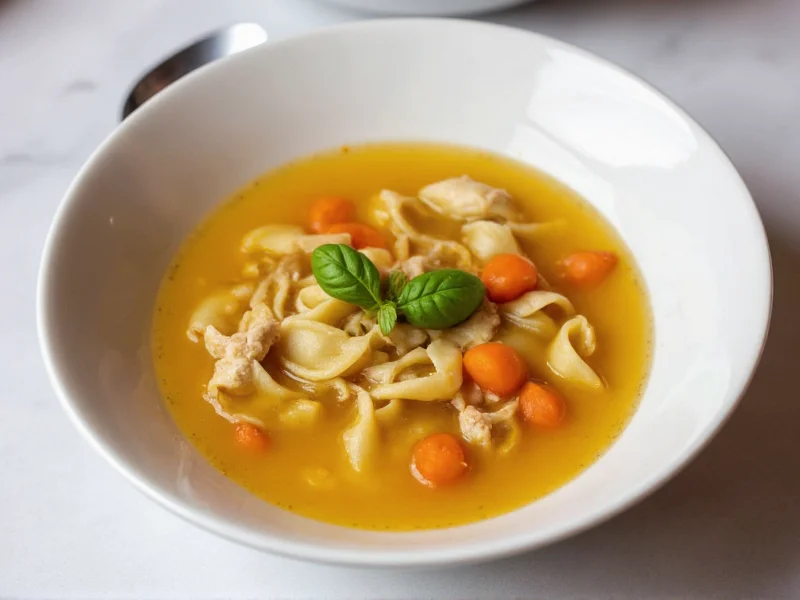For generations, chicken noodle soup has been a go-to remedy when cold symptoms strike. But does this kitchen staple actually help, or is it merely an old wives' tale? Modern research reveals compelling evidence that chicken noodle soup offers genuine physiological benefits during upper respiratory infections.
The Science Behind Soup's Cold-Fighting Properties
Multiple studies published in respected medical journals demonstrate chicken soup's anti-inflammatory effects. Researchers at the University of Nebraska Medical Center found that chicken soup inhibits neutrophil migration - a key process in the body's inflammatory response that causes cold symptoms like nasal congestion and sore throat. The soup's steam also provides immediate relief by increasing nasal mucus velocity, helping clear congestion more effectively than hot water alone.
When you're battling a cold, maintaining proper hydration becomes critical. Chicken noodle soup delivers fluids with electrolytes that plain water doesn't provide, preventing dehydration that can worsen symptoms. The warm liquid soothes irritated throat tissues while the gentle heat helps loosen mucus in your airways.
Key Ingredients That Make the Difference
Not all chicken soups offer equal benefits. Research indicates that homemade versions with specific ingredients provide superior relief compared to canned alternatives. The most effective recipes include:
| Ingredient | Benefit for Cold Symptoms | Scientific Support Level |
|---|---|---|
| Chicken (especially dark meat) | Provides cysteine, an amino acid similar to acetylcysteine used in some cold medications | Strong |
| Vegetables (carrots, celery, onions) | Deliver antioxidants and anti-inflammatory compounds | Moderate |
| Garlic | Contains allicin with potential immune-boosting properties | Preliminary |
| Herbs (parsley, thyme) | Provide additional antioxidants and soothing properties | Moderate |
Optimizing Your Soup for Maximum Relief
To create chicken noodle soup that delivers the most symptom relief, consider these evidence-based preparation tips:
- Include the skin - Chicken skin contains gelatin that may help soothe irritated membranes
- Add vegetables early - Simmering vegetables longer extracts more beneficial compounds
- Use whole chicken pieces - Bones release collagen and minerals during cooking
- Keep noodles separate - Prevents soup from becoming too starchy which can worsen congestion
- Serve hot but not scalding - Optimal temperature maximizes steam inhalation benefits
Realistic Expectations: What Soup Can and Can't Do
While chicken noodle soup offers genuine symptom relief, it's crucial to understand its limitations. This comforting food doesn't shorten the duration of your cold or kill the virus causing your illness. It won't replace proper medical treatment for severe symptoms or complications like bacterial infections.
The most significant benefits come from:
- Improved hydration status
- Temporary reduction in nasal congestion
- Calorie and nutrient delivery when appetite is low
- Psychological comfort that may support immune function
When to Seek Medical Attention
Chicken soup works well for typical cold symptoms, but certain warning signs require professional medical evaluation. Contact your healthcare provider if you experience:
- Fever above 102°F (38.9°C) lasting more than three days
- Symptoms worsening after initial improvement
- Difficulty breathing or chest pain
- Symptoms persisting beyond 10-14 days
- Severe headache or facial pain suggesting sinus infection
Practical Application for Cold Recovery
For optimal results when using chicken noodle soup as part of your cold recovery:
- Consume 1-2 cups every 2-3 hours while symptoms are active
- Inhale the steam directly before eating to maximize decongestant effects
- Pair with adequate rest and additional fluids like herbal teas
- Continue taking prescribed medications as directed
- Avoid overly salty commercial varieties that could promote dehydration
While chicken noodle soup for colds won't work miracles, its combination of hydration, nutrition, and scientifically supported physiological effects makes it a valuable component of home care for upper respiratory infections. The next time cold symptoms strike, reaching for this traditional remedy has more scientific backing than many realize.











 浙公网安备
33010002000092号
浙公网安备
33010002000092号 浙B2-20120091-4
浙B2-20120091-4